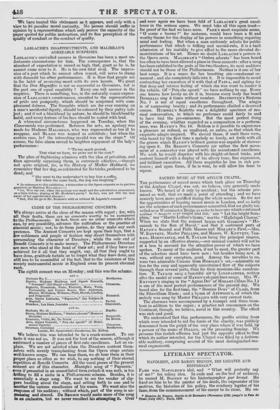SACRED MUSIC AT THE ASYLUM CHAPEL.
THE performance of sacred music which took place on Thursday at the Asylum Chapel, was not, we believe, very generally made known. We heard of it only by accident ; but the scheme pro- mised so well, that we made a point of attending ; and we have scarcely been more gratified during the whole season. So few are the opportunities of hearing sacred music in London, and so lazily are the schemes of such performances concocted, that we gladly tra- veiled over Westminster Bridge in order to hear one which contained neither " Ange13 ever bright and fair,- nor " Let the bright Sera- phim," nor "Martin Luther's hymn," northe "Hallelujah Chorus." When we state that the concert began with GIBBONS'St " Ho- sannah to the Son of David," and that it embraced parts of HAYDN'S Second and Fifth Masses and MOZART'S First,—Mrs. W. KNYvErr, Master PHILLIPS, and Messrs. W. KNYVETT, TER- RAIL, HORNCASTLE, and E. TAYLOR being the principal singers, supported by an effective chorus,—our musical readers will not be at a loss to account for the attractive power of which we have spoken. To many of the auditors, if not to most, the greater part of the selection must have been new ; but besides being new, it was, without any exception, good. Among the novelties to us, were two admirable Canons from HORSLEY'S set,—admirable no less for the easy and apparently unrestrained flow of the subjects through their several parts, than for their musician-like construc- tion. E. TAYLOR sang a beautiful air by LINDPAINTER, written after the model of some of HAYDN'S elegant bass songs. Mrs. W. KNYVETT'S singing in the " Agnus Dei" of MOZART Mass No. I.) is one of the most perfect performances of the present day. We heard also for the first time, the " Domine Deus" of CLA.RI, from the Fitzwilliam Music ; and a hymn of ATTWOOD'S, of which the melody was sung by Master Paieefrs with very correct taste.
The choruses were accompanied by a trumpet and three trom- boni in addition to the organ ; a practice not uncommon on the Continent, though, we believe, novel in this country. The effect was rich and good. We understood that this performance, the profits arising from which were intended to aid the funds of the charity, was publicly denounced from the pulpit of the very place where it was held, by a person of the name of DILLON, on the preceding Sunday. We presume this foolish effusion had just the opposite effect to that which its author intended, for the Chapel was filled by a fashion- able auditory, comprising several of the most distinguished mu- sical cognoscenti.


























 Previous page
Previous page